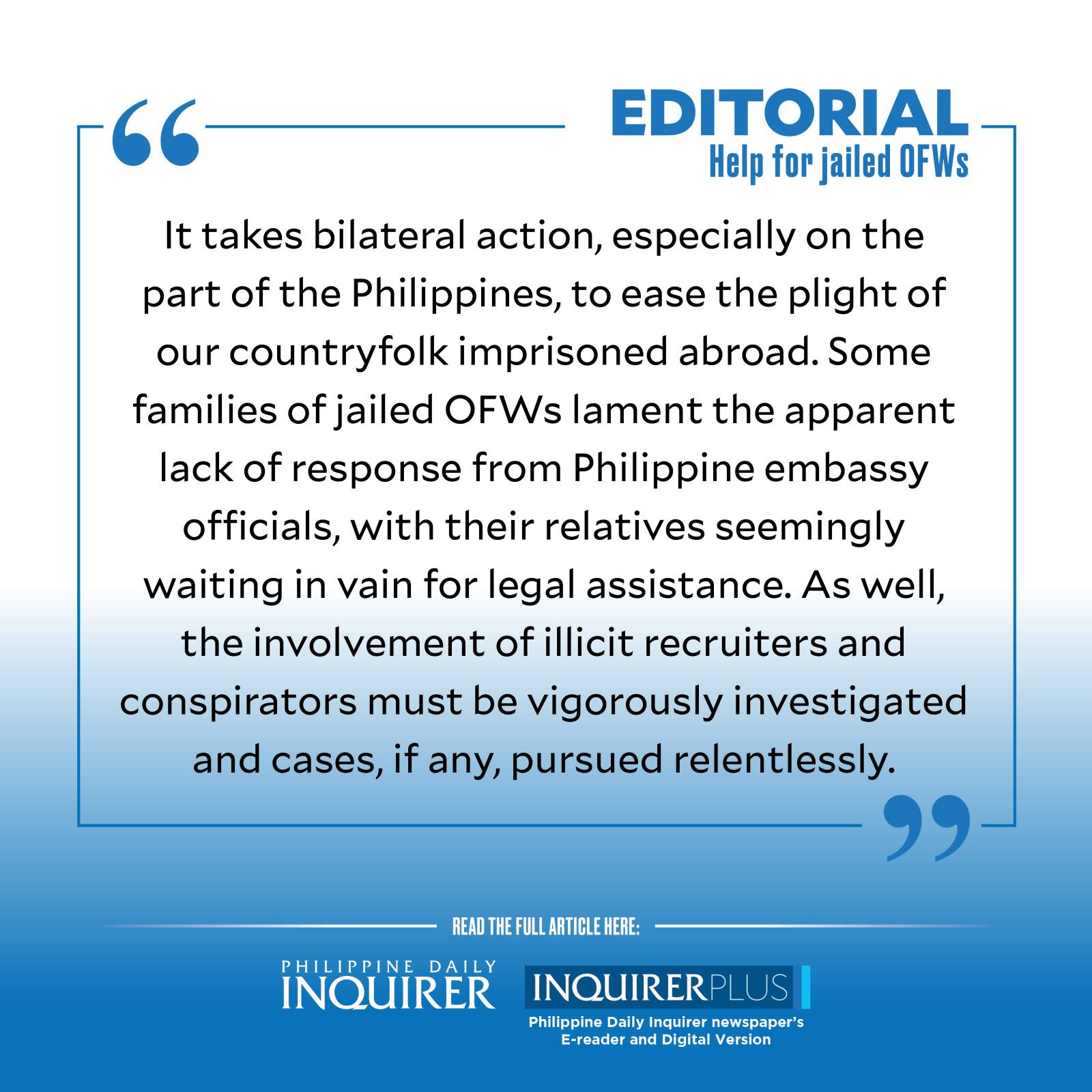Help for jailed OFWs

On Friday last week, three OFWs or overseas Filipino workers were granted “humanitarian pardon” by United Arab Emirates (UAE) President Sheikh Mohamed bin Zayed Al Nahyan.
The UAE ambassador to the Philippines said the pardons—granted to two individuals convicted of drug trafficking and one sentenced to 15 years for the crime of slander—was the successful result of an appeal to the UAE by President Marcos. Palace spokespersons said that the President thanked the UAE leader while Sheikh Mohamed said that overseas Filipinos in UAE give valuable contributions to his country.
While such pardons are given and negotiated on a case-to-case basis, the development in UAE augurs well for other Filipinos sentenced in foreign courts or languishing in jail cells. Most prominent of these cases is that of Mary Jane Veloso who has spent over 10 years in jail on drug trafficking charges in Yogyakarta, Indonesia.
Recently, a reprieve of sorts was granted to Veloso when her family, along with government representatives, her lawyers, and officials of the international migrant group Migrante International, were allowed to see her face-to-face for a brief visit.
Saying Veloso was grateful for the chance to see her parents and two sons last month, Migrante International chair Joanna Concepcion said Veloso was thankful for another chance to meet with her family after five years.
Mr. Marcos had urged Indonesian President Joko Widodo to reconsider the merits of Veloso’s case when they met during the recent Asean Summit. But the Department of Foreign Affairs (DFA) said that the Philippines has yet to receive a response from Indonesia on the appeal.
Veloso was sentenced to death after being found guilty of drug trafficking. But the circumstances bear more looking into. Heroin was reportedly found in her luggage when she arrived at Yogyakarta Airport in 2010. She strenuously denied charges of being a drug mule, or at least a conspirator in the scheme. Veloso’s illegal recruiters, who she said had duped her into carrying the drugs in her luggage, were convicted in 2020 on illegal recruitment charges.
In 2015, Veloso was given a last-minute reprieve from the death penalty after the late President Benigno Aquino III made a call to Indonesian authorities.
While we should all be grateful for the successful results of such personal and direct appeals from government officials, including the President, we must remember that hundreds more Filipinos, the majority of whom are OFWs, remain behind bars and await government action on their cases. Former senator Ralph Recto has disclosed that 3,827 Filipinos remain in jail in 52 countries and territories.
While the DFA, its local lawyers, and groups like Migrante International strive to provide legal representation for our countryfolk, it seems that in many cases the suspects, convicts, and detainees can do nothing but wait for the results of high-profile negotiations including personal phone calls and negotiations between the leaders of the nations involved.
But DFA Undersecretary Eduardo de Vega said that extending the time allotted to our countryfolk is already a significant development. Referring to Veloso’s case, De Vega said that every day that Veloso remains alive means “Indonesia is listening to us.”
“We think as an Asean neighbor and friend,” said De Vega, “[that] the Indonesian government will be lenient to our pleas.” “At least [Veloso] has many allies,” added the diplomat, “not only the Philippine government but even some people in Indonesia.”
De Vega mentioned, among other groups, Indonesia’s National Human Rights Commission and women’s groups as being supportive but that the commission is hoping for movement in the human trafficking case filed against Veloso’s recruiters.
In other words, it takes bilateral action, especially on the part of the Philippines, to ease the plight of our countryfolk imprisoned abroad. Some families of jailed OFWs lament the apparent lack of response from Philippine embassy officials, with their relatives seemingly waiting in vain for legal assistance. As well, the involvement of illicit recruiters and conspirators must be vigorously investigated and cases, if any, pursued relentlessly to either prove the innocence of detainees or get to the bottom of a criminal conspiracy.
As well, the government can reach out to local civic groups and human rights bodies, as it has in Indonesia, and even to international advocacy groups, to win greater support for those whose cases had been mishandled and give a “local perspective” to efforts to free countryfolk unjustly jailed. After all, they remain Filipinos who should enjoy the same rights and access to justice as they would at home.




















